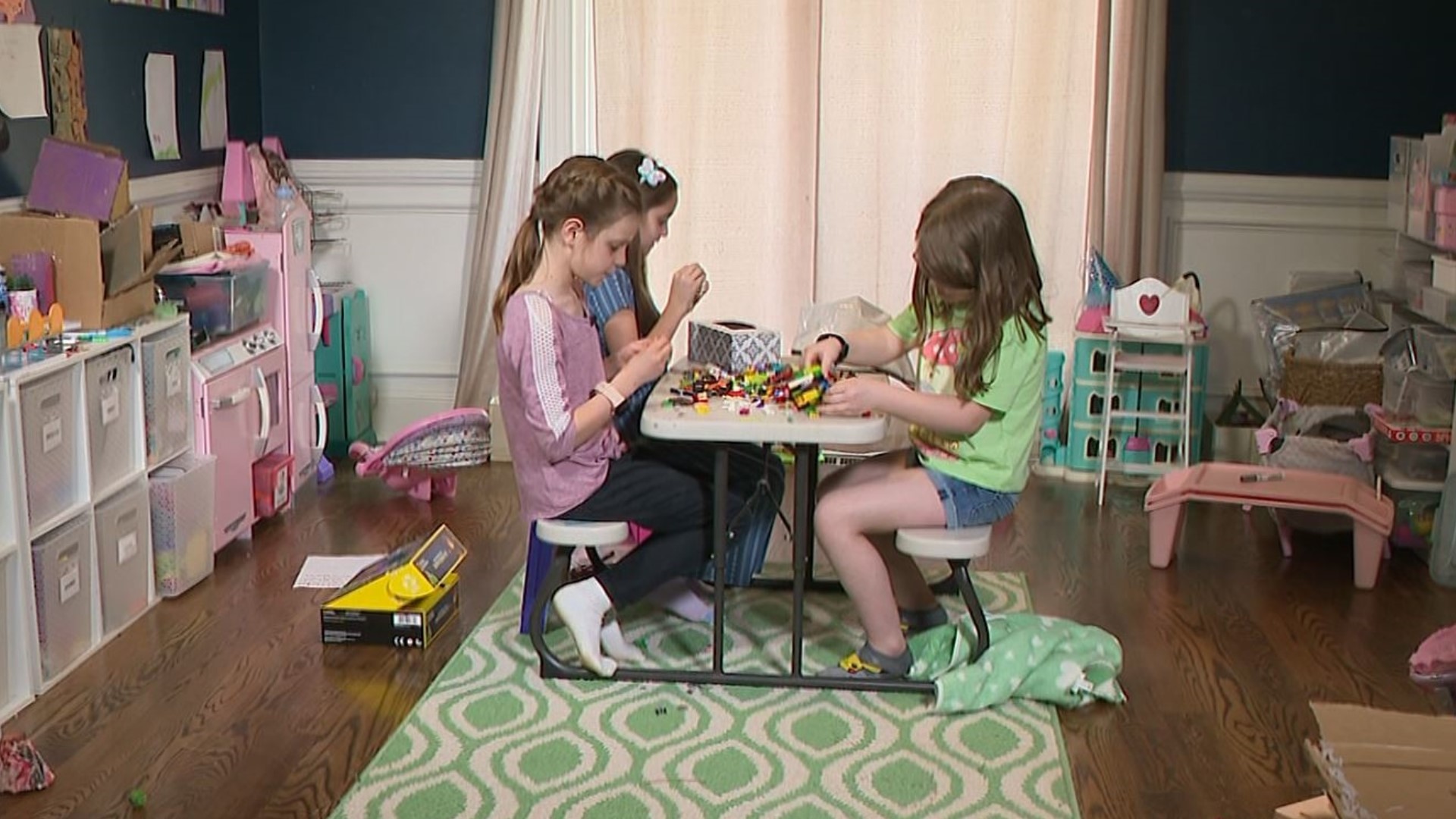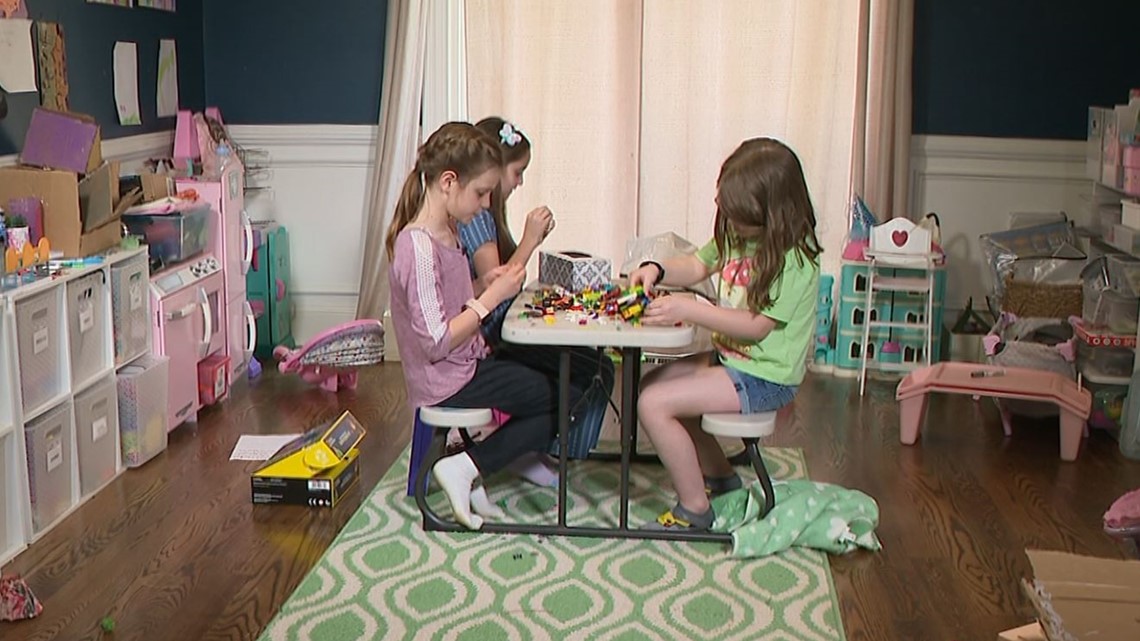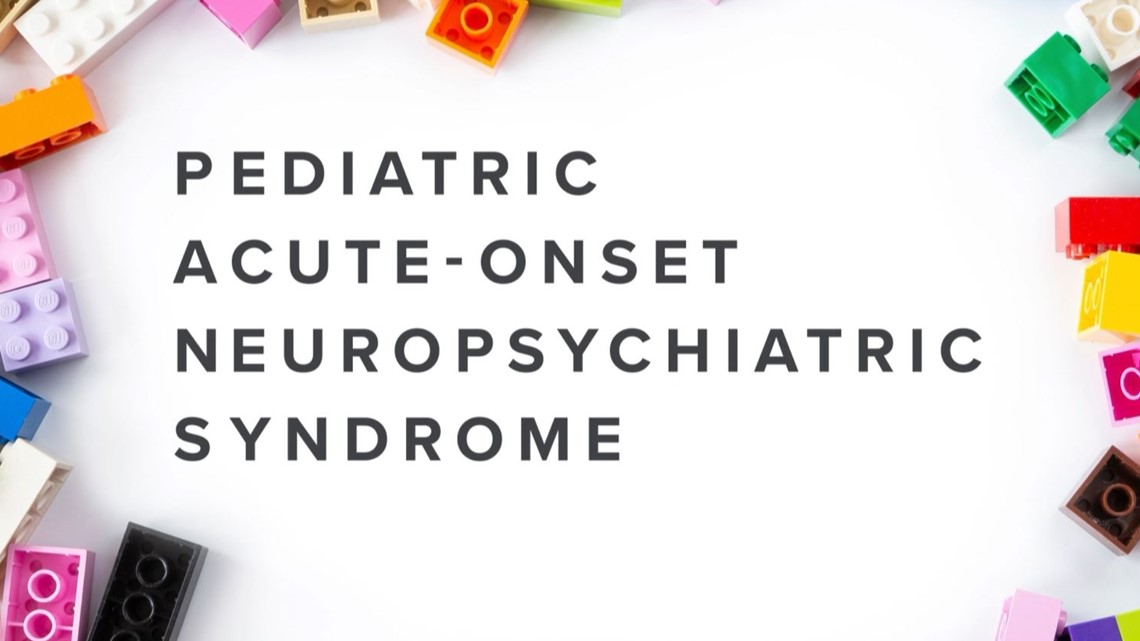Georgia doesn't treat this devastating diagnosis in kids | How families are navigating care
Families whose children are diagnosed with PANS or PANDAS say they cannot find medical providers who will treat their kids.

Three Georgia mothers say their daughters went from happy, playful girls to children struggling with anxiety and rage overnight.
They've come to the same conclusion: their daughters have a serious medical diagnosis. It's backed up with documentation - but some doctors refuse to treat them.
Those doctors say the diagnosis, PANDAS or PANS, doesn't exist.
It's a medical conundrum in the pediatric neurology and rheumatology fields - and it's putting thousands of parents in a dilemma finding and affording care for their child.
Here's just a glimpse of what some families face.
Personality changes
Kelly Grant, Nicole Furrow and April Beck share this common conundrum. Their girls just met, but they seemed to be a perfect fit.
Their moms say they were a perfect picture of health.
"She is the most cheerful, happy-go-lucky, confident little girl," Grant said, describing her now 9-year-old daughter.
"She was super precious, never gave us temper tantrums, just a joy," Furrow shared about her 7-year-old little girl.
But practically overnight, their perfect picture was ripped apart.
'Like a light switch was flipped'
"It was like a light switch was flipped," Grant said.
"One day, she would wake up in the middle of the night and be completely unhinged, screaming, kicking, banging down our door," Grant recalled. And it's like that had never happened—not one day in her life. Then, seven months, every single night, banging my door down all night long."
Furrow said her 7-year-old daughter was "the dream child" until she experienced symptoms that were "the exact opposite of how she ever was."
"Something wasn't right because it was a very sudden onset," Furrow explained. "She turned into a stiff board and gave us 30-minute temper tantrums. She started waking in the night, she was always a great sleeper, all night every night."
Beck said it was similar for her 8-year-old daughter, too.
"She ended up hospitalized, having to get a feeding tube, and that was all within 10 days," Beck said about her daughter.
Most days, the girls looked fine, but their moms knew something was terribly wrong.


Searching for answers
Grant, Beck, and Furrow joined thousands of other parents, some of whom shared videos online, as they searched for an explanation for the sudden and dramatic changes they saw in their children.
"It went from the worst thing you can imagine: debilitating anxiety, afraid to go to school, afraid to go anywhere," Beck explained, to her daughter taking antibiotics for seven days and being completely fine.
"An antibiotic fixed her anxiety? That doesn't make sense," Beck said.
Grant said her daughter's anxiety started to tip over to depression.
"She had a full-on panic attack; she was shaking, she was sweating, she was afraid she was going to get sick, she was afraid to be sick, she couldn't eat," Grant said tearfully. "She said, 'I just want to be with Jesus, I don't want to be here.'"
'We don't treat that'
She, like the other mothers, started to search for for a reason behind symptoms online. They cast a wide net for behaviors that aligned with obsessive-compulsive disorder (OCD), tics, crushing anxiety and sudden changes in personality.
"As I was researching, I typed in all of her symptoms and PANS/PANDAS came up!" Furrow exclaimed. "A mama heart, I'm like, 'this is it, I knew it.'"
As she read about PANS and PANDAS, she felt empowered to finally find answers for her daughter and was one step closer to getting her daughter back to a sense of normalcy.
"I called my pediatrician, and they said, 'We don't treat that,'" Furrow explained. "I was shocked because I know 100% this is what my daughter has, and they refused to treat it."
Discovering a diagnosis
What is PANS, PANDAS?
Pediatric Acute-onset Neuropsychiatric Syndrome (PANS) can affect one out of every 200 children in the U.S., according to the PANDAS network.
The general belief is that these children are battling an infection, like strep throat. Their immune system produces proteins like antibodies to protect itself. Some doctors believe that in certain cases, these antibodies may mistake their own immune system as foreign and actually attack the child's own body, including the brain, triggering inflammation. Thus, this auto-immune attack can cause neuropsychiatric changes in the child that can present as behavioral changes.


"All of a sudden, they see a huge change in behavior, anything from OCD to tics, to massive changes in behavior, anger - it's almost like a flip of a switch," New View Integrative Pediatrics Nurse Practitioner Melissa Smith said.
Those who continue to study the diagnosis have broadened the diagnosis to PANS. It encompasses Pediatric Autoimmune Neuropsychiatric Disorders Associated with Streptococcal Infections (PANDAS) and other symptoms thought to be caused by non-strep infections or other inflammatory disturbances to the symptoms. These non-strep infections include bacteria and viruses like Lyme disease, mycoplasma pneumonia or walking pneumonia, herpes and the common cold, according to the National Institutes of Health.


Doctors say flare-ups can come on after an infection and cause extreme changes in behavior, rage, and abnormal movements.
"These families have incredibly sick children, and these children are disintegrating right in front of their eyes, and they're so frustrated that they go to medical professional after medical professional and fail to get any answers," University of Florida Professor and filmmaker Tim Sorel said.
Families fighting for treatment
Difficult to diagnose
Sorel spent years following families with this diagnosis. His film, My Kid is Not Crazy from 4 The Kids Films, explores the complexities of it all.
"I think the disconnect comes from there's a lot of physicians that are simply afraid of this disease," he said. "It's not easy to diagnose, and it's not easy to treat. And so I do think that there's a certain population of physicians that shy away from things that they don't know. They want to be the expert. They want to be the person that solves this. And when they have to say, 'I don't know,' I think it bothers them."
WATCH: Sorel's take on why PANDAS could be a tough diagnosis to accept. The story continues after the video below.
Furrow said the guessing game with her daughter made it that much harder on their family.
"Something didn't sit right with me," she said, "antidepressants for a 5-year-old? I just don't know that that's the right step."
She grew more concerned as doctors sought to medicate her daughter and grew more confused as to why PANDAS wasn't recognized as a viable diagnosis.
"It's mind-boggling, honestly," she said.
Smith, who has worked in pediatrics for decades and tackles treatment with a functional integrative medical approach, said the field has evolved over the years.
"I've been in peds for over 24 years, and we are seeing a lot of changes in kids and behavioral changes," she said. "PANS and PANDAS have been a diagnosis since the 90s, but most people don't consider that in the medical community, and I am not sure why."
She adds that in medicine, professionals are tasked with addressing the issue at hand and not necessarily digging deeper. If a treatment works, at least in the short term, there may not be more reason to investigate the cause of the child's new reactions.
"They'll do routine tests, they'll do CT scans, they'll do blood work, and they'll tell the parent, she's fine," she said.
WATCH BELOW: 'My Kid is Not Crazy,' a film by Tim Sorel. The story continues after the video below.
A medical community at odds
The disagreement behind the diagnosis
"This has been seen as a controversial diagnosis," Sorel said.
He explained that a group of neurologists argue that a strep throat infection may not be the cause of PANDAS. It has split the medical community to consider PANDAS separate from PANS and some not to consider either as a diagnosis.
"There is the controversy," Sorel said. "There's no controversy these kids are sick."
Beck has seen this firsthand.
"When Children's Healthcare of Atlanta got my referral, they contacted my doctor back and said, 'We don't treat that,'" she explained. "Some of them (doctors) won't believe you; most have never heard of it."
The American Association of Pediatrics does not recognize the correlation between an infection and a diagnosis, saying there is not enough evidence. Instead, the AAP recommends managing or treating such symptoms by relying on specialists like child psychiatrists, neurologists or behavioral and developmental pediatricians.
Affording treatment
Health insurance is another hurdle.
The National Institute of Health came up with the diagnosis in 1998, but providers argue it is not a disease at all and instead see it as severe anxiety in children.
Insurance companies won’t cover the standard treatment, which can cost around $15,000 out of pocket.
"This is just really frustrating and confusing, and it doesn't make sense. Why are they blocking us from trying to get care for our child?" said Beck.
Parents who do fight to find treatment, however, usually have to travel and treat it as an out-of-pocket cost.
Limited care in Georgia
Children's Healthcare of Atlanta confirmed to 11Alive that PANS or PANDAS are not diagnosis that it treats.
"I was just so disappointed because CHOA is held in such high regard," Beck said. The metro Atlanta mother added that she's planning to travel to Arkansas for care.
"There is a huge population of kids in the metro area that are being denied help and care, and their parents (are) bled dry financially," the mother said, adding that the family has spent around $20,000 on medical care for their daughter.
"It's devastating, it's disappointing because parents need help," Smith said.
The nurse practitioner left her job to start a practice focused on functional integrative medicine for kids with PANS and PANDAS. She is one of the only providers in Georgia who will treat the condition, and she does not accept insurance.
"As a mom, it broke my heart because these kids are different, and the parents know that," she said, "and they are struggling to get the help they need."
But answers for the kids who are suffering could be years in the making.
"You're just in this place of hopelessness and desperation," Beck said.
These families want to picture a different future for their kids.
"It feels like road block after road block when you are just trying to help your child who is suffering," said Beck.
Two bills were going through the legislature to help families, one to create a clinical study for PANDAS and one to mandate insurance coverage for the disease.
Both failed.
"This is not a diagnosis for an individual; this is a diagnosis for a whole family," Grant said. "I'm just frustrated that because she looks like everybody else, she's not getting the care that she deserves."
Children’s Healthcare of Atlanta statement
Children’s Healthcare of Atlanta will be opening a clinic at the end of 2024 to help treat behavioral impairments in children with complex neuropsychiatric conditions. This clinic will bring together specialists across multiple disciplines, including psychiatry, psychology, and neurology, to provide a multi-disciplinary approach, including diagnostics, diagnosis and treatment in a variety of behaviors for children with neurologic or medical conditions complicated by severe behavioral impairment. The clinic will be offered at the Center for Advanced Pediatrics once it’s open.
